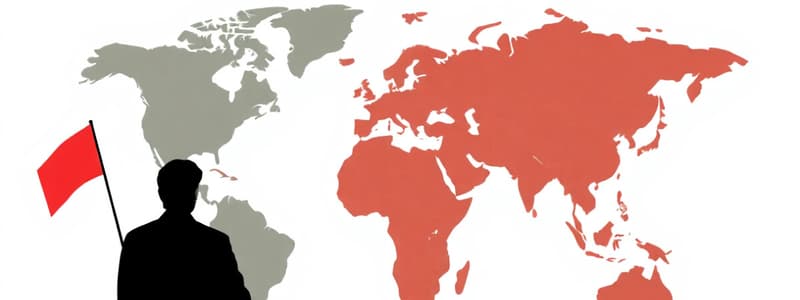Podcast
Questions and Answers
Which of the following is a sub-discipline of political science?
Which of the following is a sub-discipline of political science?
- Psychology
- Comparative Politics (correct)
- Sociolinguistics
- Ecology
What is the primary focus of international relations?
What is the primary focus of international relations?
- Management of public programs
- Analysis of historical political theories
- Interactions between nations (correct)
- Theories of individual behavior
Which thinker is known for developing the concept of the social contract in political theory?
Which thinker is known for developing the concept of the social contract in political theory?
- Machiavelli
- Aristotle
- Marx
- Locke (correct)
What is a key component of public policy?
What is a key component of public policy?
Which political system is characterized by a single ruling party with total control over the state?
Which political system is characterized by a single ruling party with total control over the state?
What do qualitative methods in political science primarily involve?
What do qualitative methods in political science primarily involve?
Which organization is primarily responsible for international diplomacy and conflict resolution?
Which organization is primarily responsible for international diplomacy and conflict resolution?
What is a common impact of globalization on states?
What is a common impact of globalization on states?
Flashcards are hidden until you start studying
Study Notes
Overview of Political Science
- Political science is the study of politics, government systems, and political behavior.
- It encompasses various sub-disciplines, including comparative politics, international relations, political theory, public administration, and public policy.
Key Concepts
-
Political Systems
- Types of governance: democracy, authoritarianism, totalitarianism.
- Structure of government: executive, legislative, judiciary.
-
Political Theory
- Major thinkers: Plato, Aristotle, Machiavelli, Hobbes, Locke, Rousseau, Marx, and Rawls.
- Key ideas: social contract, justice, power, authority, rights.
-
Comparative Politics
- Focus on comparing different political systems and governments.
- Analysis of political institutions, processes, and behavior across countries.
-
International Relations
- Study of interactions between nations, including diplomacy, conflict, and cooperation.
- Theories: realism, liberalism, constructivism, neorealism.
-
Public Administration
- Management of public programs and the implementation of government policy.
- Importance of bureaucracy, public service, and ethical governance.
-
Public Policy
- Process of policy-making, including agenda-setting, formulation, adoption, implementation, and evaluation.
- Role of political actors, interest groups, and public opinion in shaping policy.
Methodologies
- Qualitative methods: case studies, interviews, content analysis.
- Quantitative methods: surveys, statistical analysis, experiments.
Current Issues in Political Science
- Rise of populism and nationalism.
- Impact of globalization on state sovereignty.
- Role of technology in politics, including social media's influence on public opinion.
- Climate change and its implications for international governance.
Important Organizations
- United Nations (UN)
- North Atlantic Treaty Organization (NATO)
- World Trade Organization (WTO)
- Non-governmental organizations (NGOs) and think tanks.
Applications of Political Science
- Policy analysis and advocacy.
- Conflict resolution and peacebuilding.
- Electoral strategy and campaign management.
- International diplomacy and relations.
Career Paths
- Academia and research.
- Government service and public administration.
- Nonprofit and advocacy organizations.
- Political consulting and lobbying.
Overview of Political Science
- Political science encompasses the analysis of politics, governance structures, and the behavior of political entities.
- Major sub-disciplines include comparative politics, international relations, political theory, public administration, and public policy.
Key Concepts
-
Political Systems
- Governance types include democracy, authoritarianism, and totalitarianism.
- Governments are structured around three branches: executive, legislative, and judiciary.
-
Political Theory
- Influential theorists include Plato, Aristotle, Machiavelli, Hobbes, Locke, Rousseau, Marx, and Rawls.
- Fundamental ideas involve the social contract, concepts of justice, the nature of power and authority, and the definition of rights.
-
Comparative Politics
- Focuses on the analysis and comparison of political systems and governmental frameworks across different nations.
- Examines political institutions and behavior in a cross-national context.
-
International Relations
- Investigates interactions between nations, including diplomacy, conflicts, and collaborative efforts.
- Major theories include realism, liberalism, constructivism, and neorealism.
-
Public Administration
- Concerns the management of public programs and effective implementation of government policies.
- Highlights the significance of bureaucracy, public service ethics, and governance accountability.
-
Public Policy
- Encompasses the stages of policy-making: agenda-setting, formulation, adoption, implementation, and evaluation.
- Political actors, interest groups, and public opinion play crucial roles in shaping policies.
Methodologies
-
Qualitative Methods
- Tools include case studies, interviews, and content analysis for in-depth exploration of political phenomena.
-
Quantitative Methods
- Employs surveys, statistical analysis, and experimental designs to gather and analyze data quantitatively.
Current Issues in Political Science
- A rise in populism and nationalism reshapes political landscapes globally.
- Globalization challenges traditional notions of state sovereignty and governance.
- Technology, particularly social media, significantly impacts political communication and public opinion.
- Climate change poses complex challenges for international governance and policy coordination.
Important Organizations
- United Nations (UN): Facilitates international cooperation on global issues.
- North Atlantic Treaty Organization (NATO): A military alliance focused on collective defense.
- World Trade Organization (WTO): Regulates international trade agreements.
- NGOs and Think Tanks: Play influential roles in policy advocacy and research.
Applications of Political Science
- Provides expertise in policy analysis and advocacy efforts.
- Engages in conflict resolution and peacebuilding initiatives.
- Involves strategic planning for electoral campaigns and political marketing.
- Plays a key role in international diplomacy and geopolitical relations.
Career Paths
- Opportunities in academia and research institutions focused on political analysis.
- Positions in government service, emphasizing public administration and policy-making.
- Involvement in nonprofit organizations and advocacy groups.
- Roles in political consulting and lobbying, influencing policy and governance decisions.
Studying That Suits You
Use AI to generate personalized quizzes and flashcards to suit your learning preferences.



